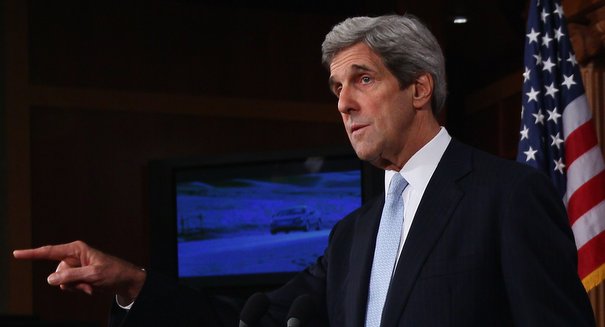John Judis
{
"authors": [
"John Judis"
],
"type": "legacyinthemedia",
"centerAffiliationAll": "",
"centers": [
"Carnegie Endowment for International Peace"
],
"collections": [],
"englishNewsletterAll": "",
"nonEnglishNewsletterAll": "",
"primaryCenter": "Carnegie Endowment for International Peace",
"programAffiliation": "",
"programs": [],
"projects": [],
"regions": [
"North America",
"United States",
"Middle East",
"Israel",
"Palestine"
],
"topics": [
"Security",
"Foreign Policy"
]
}
Source: Getty
John Kerry Could Revive Peace Talks, but Don't Count on It
Secretary of State John Kerry and the White House appear to have given up hope of pressuring the Israelis to conduct meaningful negotiations with Palestine.
Source: New Republic
Negotiations have continued between the Israeli government and the Palestinian Authority, but they appear to be negotiations over negotiations. Each side wants to prolong them so that the other is blamed for their breakdown. But after initially equivocating, Secretary of State John Kerry put the blame for the breakdown squarely on the Netanyahu government, which reneged on its promise of last July to release a last batch of Palestinian prisoners on March 29 and which approved that same week new settlement construction in the occupied West Bank. "Unfortunately, prisoners were not released on the Saturday they were supposed to be released," Kerry told the Senate Foreign Relations Committee yesterday. "And so day went by, day two went by, day three went by. And then in the afternoon, when they were about to maybe get there, 700 settlement units were announced in Jerusalem and, poof, that was sort of the moment. We find ourselves where we are."
Kerry and the White House appear to have given up home of pressuring the Israelis to conduct meaningful negotiations. “There are limits to the amount of time the president and myself can put into this, especially if the parties can’t commit to being there in a serious way,” he said. And Kerry is probably right that prolonging the current negotiations would be a waste of the administration’s time. But there is a path outside the negotiations for the Obama administration that might eventually lead to constructive talks between the parties. The trouble is that it will require defying not only the Israeli government, but also the U.S. Congress, AIPAC, and other even more conservative pro-Israel lobbies. It would mean supporting Mahmoud Abbas and the Palestinian Authority’s attempt to bring the United Nations and other international organizations into the negotiations.After the Netanyahu government reneged on its promise to release the prisoners, Abbas signed letters of accession to 15 international treaties and conventions. By doing this, Abbas was asserting the PA’s right to be treated as a state, but none of the treaties will have any new legal effect on Israel. On the contrary, they affect the Palestinians rather than the Israelis. By signing them, the Palestinians agree, for instance, to adhere to conventions on the rights of children and women and against apartheid, torture, and genocide. As Human Rights Watch has pointed out, the PA has opened itself to censure for torturing its own prisoners and other violations of human rights.
But Abbas has threatened that if the talks don’t succeed by the April 29 deadline, the PA will join 48 additional international organizations and treaties. These 48 organization and treaties are likely to include the International Criminal Court (ICC), which is not part of the U.N. and which has jurisdiction over war crimes. The ICC cannot currently charge Israel for war crimes, because it is not a signatory to the Rome Statute establishing the court, but if Palestine, which was given non-member status by the General Assembly of the United Nations two years ago, were admitted, it could charge Israel with war crimes committed in its territory. In a recent report, Amnesty International has suggested that Israel might have committed war crimes in Gaza and the West Bank by, among other things, indiscriminately targeting civilians and torturing prisoners. The prospect of charging officials is arduous, and it’s unlikely that any Israeli officials would be charged, but even the prospect, and the debate over the prospect, could prove chilling to a country founded in part as a refuge from the worst war crimes in history. (That particular prospect, I admit, gives me misgivings. Of all the international initiatives, this is the one the U.S. should still seek to block.)
The 48 would also be likely to include the U.N.’s World Health Organization and Food and Agricultural Organization. According to legislation Congress adopted in 1994, when it was skeptical of the Oslo talks, the United States has to withdraw funding from any U.N. organization that admits the Palestinian Liberation Organization (or PA) with “the same standing as member states.” The U.S. has already withdrawn funding from the U.N. Educational, Scientific, and Cultural Organization (UNESCO), which admitted the PA in 2011. That crippled UNESCO, which depended on the United States for a third of its funding. And a withdrawal from WHO and other groups could have a similar effect. The U.N. itself would be the principal victim of the PA’s move, but the U.S. and Israel would also suffer embarrassment.
The U.S. could exert leverage on its own, but it may not want to act like Israel's overlord, and there are other things that the U.N. could do that might prod the Israeli government to negotiate an end to the occupation. If the United States had not threatened a veto, the Security Council could have made Palestine a member state. After having to helped to found the state of Israel in 1947—when negotiations had failed between Palestine’s Jews and Arabs—the U.N. would be doing likewise for the Palestinians. As a more extreme step—if U.N. disapproval failed to budge the Israelis—the Security Council could also vote sanctions against Israel, directed specifically at goods from settlements in the occupied territories, to get it to adhere to Resolution 242, which was passed in the wake of the Six-Day War in 1967, and which requires Israel to “withdraw from territories occupied in the recent conflict.” (There has always been debate over the absence of the definite article “the” before the word “territories” in the English, but not French version, of the resolution, but there is no interpretation that would condone the scope of the current occupation.)
A U.N. effort to enforce Resolution 242 through sanctions would conform with the original purpose of the U.N., which was to ease the transition away from colonial occupations. The Israelis could respond to U.N. pressure by becoming even more intransigent. But consider the way that the George H. W. Bush administration’s threat in 1991 to withhold loans got the Israelis to participate in Madrid talks, which led in turn to the Oslo negotiations. That suggests that real pressure from the U.N. could work—the U.N. itself couldn't resolve the conflict, but it could get the parties to the table—where allowing things to disintegrate further on the ground, especially in the West Bank and Gaza, would not. It would also come at a time when Palestinian leadership on the West Bank is extraordinarily moderate. A strong U.N. move could avoid more decades of war, riot, rebellion, impoverishment, imprisonment, death, and destruction. It would not lead to the destruction of Israel, but to the creation of an Israeli and a Palestinian state side by side—politically independent, but, as the original U.N. proposal foresaw, economically integrated.
The Israeli government is not only opposed to U.N. implementation of Resolution 242. It has vigorously denounced the Palestinians for signing the 15 treaties, even though they have no effect on Israel and threatened reprisals. “Unilateral moves by Palestinians will be met by unilateral moves by Israel,” Netanyahu declared last Sunday. These moves could include, Israeli cabinet officials warned, withholding taxes that Israel, as the occupying power, collects for the Palestinians—an unconscionable act that would amount to simple theft. What appears to concern the Israelis is not the 15 treaties themselves, but the fact that the Palestinians signed them as a state and that they now threaten to go beyond the 15.
The United States can be expected to oppose any new attempts by the PA to gain member status at the U.N. Given Kerry’s assessment of who is to blame for the breakdown of current negotiations, you might have expected the administration to view the Palestinians’ signing the 15 treaties sympathetically. That has not been case. U.N. Ambassador Samantha Power, who before she became a public official was a noted proponent of human rights, came out squarely against the Palestinian initiative. In April 3 hearings before a House Appropriation subcommittee, Power declared her opposition to the Palestinians and her support for Israel. Asked about the Palestinians’ treaties by Representative Debbie Wasserman-Schultz, Power replied:
Power declared the administration’s “firm opposition to any and all unilateral actions in the international arena, including on Palestinian statehood, that circumvent or prejudge the very outcomes that can only come about through a negotiated settlement.” Instead of acknowledging that the Netanyahu government had blocked negotiations, and that pressure from the U.N. and other international bodies could be used to revive them, Power accused the Palestinians of undermining the talks by seeking international recognition. And the administration is unlikely to reverse Power’s stand against using the U.N. to get negotiations going.
Obama tried during his first three years in office to resolve the conflict between the Israelis and Palestinians, but facing an unyielding Netanyahu and opposition from AIPAC and from Democratic contributors, including Haim Saban, he gave up; and when the Palestinians tried to win recognition at the U.N. in September 2011, Obama took the lead in opposing them. He allowed Kerry to attempt to revive negotiations in July 2013, but he did not put White House muscle behind him. The White House has wagered its chips on a successful nuclear deal with Iran, and it has not wanted to add an additional source of conflict with the Israelis. As a result, Kerry has had to make do through sheer persuasion, which in the case of this conflict, has never sufficed.
There is an irony here. In the wake of George W. Bush’s disastrous failure in Iraq, Obama came into office committed to withdrawing American troops from the Middle East and South Asia and to avoiding new military commitments. But if an administration wants to effect change overseas, and if doesn’t want to threaten or use force to do so, its other option is to act through international organizations. That was the implicit argument of Obama’s 2006 campaign manifesto, The Audacity of Hope, which he wrote with Power’s help. “No country has a bigger stake than we do in strengthening international institutions,” Obama wrote. But where international institutions could play a constructive role–in helping to resolve the conflict between Israel and the Palestinians—the Obama administration has balked in using them. Instead, it has pursued a strategy of talk for its own sake that in retrospect appears to have been feckless.
About the Author

Former Visiting Scholar
As a visiting scholar at Carnegie, Judis wrote The Folly of Empire: What George W. Bush Could Learn from Theodore Roosevelt and Woodrow Wilson.
- This Election Could be the Birth of a Trump-Sanders ConstituencyIn The Media
- Policy ChopsIn The Media
John Judis
Recent Work
Carnegie does not take institutional positions on public policy issues; the views represented herein are those of the author(s) and do not necessarily reflect the views of Carnegie, its staff, or its trustees.
More Work from Carnegie Endowment for International Peace
- Iran Is Pushing Its Neighbors Toward the United StatesCommentary
Tehran’s attacks are reshaping the security situation in the Middle East—and forcing the region’s clock to tick backward once again.
Amr Hamzawy
- The Gulf Monarchies Are Caught Between Iran’s Desperation and the U.S.’s RecklessnessCommentary
Only collective security can protect fragile economic models.
Andrew Leber
- Duqm at the Crossroads: Oman’s Strategic Port and Its Role in Vision 2040Commentary
In a volatile Middle East, the Omani port of Duqm offers stability, neutrality, and opportunity. Could this hidden port become the ultimate safe harbor for global trade?
Giorgio Cafiero, Samuel Ramani
- Europe on Iran: Gone with the WindCommentary
Europe’s reaction to the war in Iran has been disunited and meek, a far cry from its previously leading role in diplomacy with Tehran. To avoid being condemned to the sidelines while escalation continues, Brussels needs to stand up for international law.
Pierre Vimont
- Lessons Learned from the Biden Administration’s Initial Efforts on Climate MigrationArticle
In 2021, the U.S. government began to consider how to address climate migration. The outcomes of that process offer useful takeaways for other governments.
Jennifer DeCesaro








